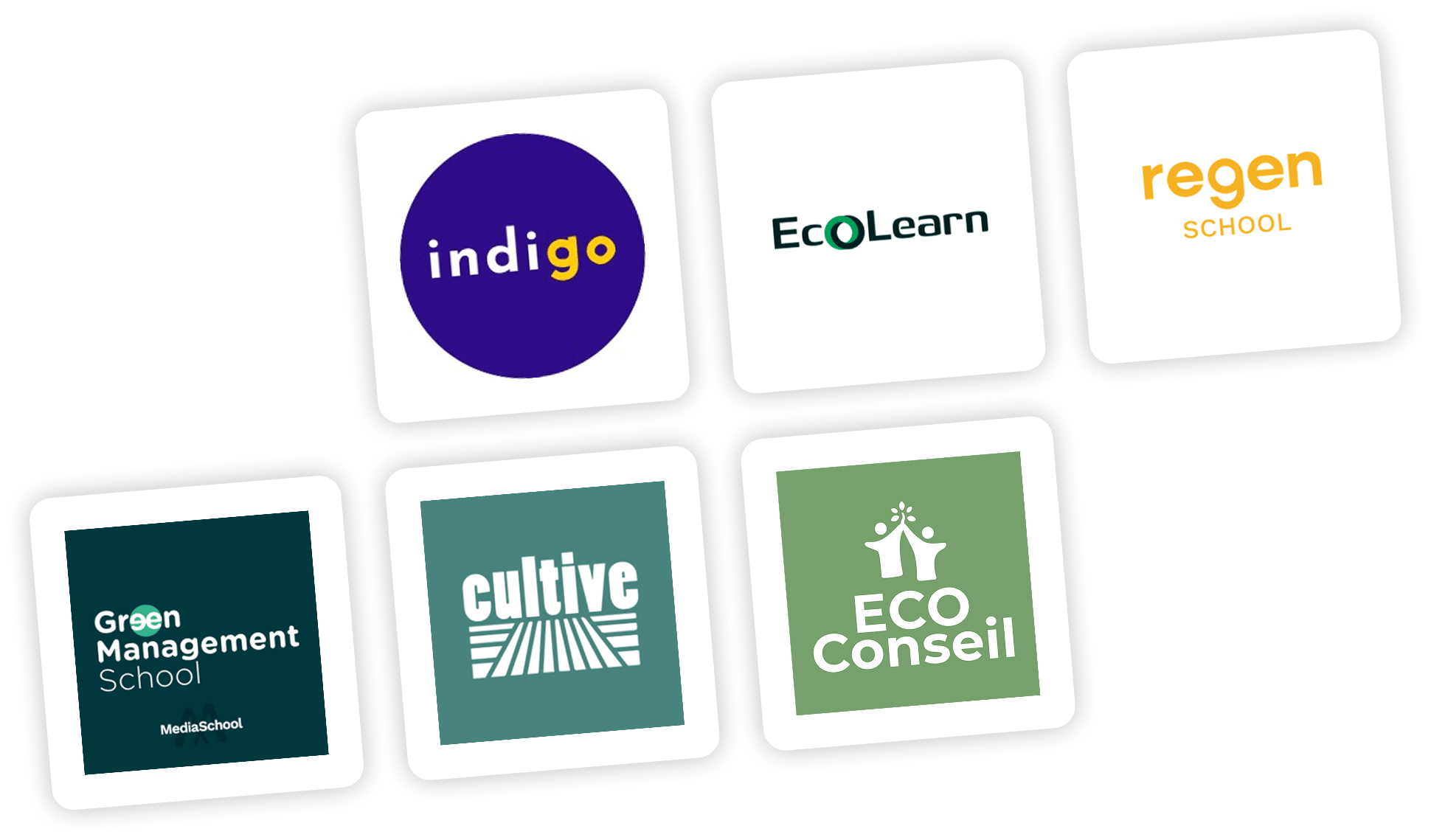5 jobs to help biodiversity
In a world where biodiversity is more threatened than ever: 68% of vertebrate populations (mammals, fish, birds, reptiles and amphibians) disappeared between 1970 and 2016, i.e. in less than 50 years (OFB), it is becoming crucial to take concrete action to preserve it.
Biodiversity, a contraction of "biological diversity", represents all the living beings and ecosystems present on Earth. It is essential to the proper functioning of our planet and to our survival. However, human activities have a considerable impact on biodiversity, leading to the disappearance of species, the degradation of natural habitats and the disruption of ecosystems. To meet these challenges, a number of professions have developed to take action in favor of biodiversity.
What's more, the ecological and societal transition requires the mobilization of all skills, through various professions dedicated to the protection and enhancement of the environment.
This article explores 5 key professions that play a vital role in safeguarding biodiversity. For each, we'll discuss their ecological and social impact, and their importance for the ecological and societal transition. We'll also give examples of the missions, training and job opportunities available to reach these positions.
1. Natural areas restoration manager
Natural area restorers play a crucial role in the rehabilitation of degraded ecosystems. Their work helps restore the functionality of natural habitats, which is essential for the survival of species and the maintenance of biodiversity. By reintroducing native plant and animal species, they contribute directly to the fight against species extinction and to ecological resilience in the face of climate change.
The natural area restoration manager is therefore a professional who works on degraded or threatened sites to restore and preserve their biodiversity. Their role is therefore crucial from an ecological point of view, as they help to safeguard natural habitats and the species that depend on them.
Last but not least, the Natural Areas Restoration Officer helps to raise public awareness of biodiversity issues and the importance of preserving ecosystems. They may also be required to work in collaboration with local players (local authorities, associations, companies) to set up projects to restore and enhance natural areas.
These projects often create jobs and provide training, strengthening the link between economic development and environmental preservation. They also promote community well-being by improving air and water quality, and providing green spaces for recreation.
Tasks of the natural areas restoration manager:
- Drawing up environmental diagnoses to assess damage and identify restoration priorities.
- Planning and implementation of restoration projects, including selection of species to be reintroduced and restoration techniques to be employed.
- Coordination with local stakeholders, authorities and volunteers to ensure project success.
- Monitoring the success of interventions through ecological indicators and adjusting strategies as necessary.
- Raising public awareness and providing information (events, guided tours, educational workshops).
2. Ecological engineer
Ecological engineers, or ingénieur⸱e écologues, provide technical and scientific expertise in the sustainable management of natural resources. They develop innovative solutions to minimize the impact of human activities on the environment, promoting circular economy and sustainable development approaches.
They are experts in ecosystems and biodiversity. Their role is to study and understand how ecosystems function, in order to propose solutions adapted to environmental challenges.
These professionals help to raise awareness and educate companies, political decision-makers and the general public about environmental issues. They play an essential advisory role in integrating the ecological dimension into development projects, which is fundamental to a successful ecological transition.
Ecological engineers contribute to the ecological transition by helping public and private players to implement environmentally-friendly projects. They may also be called upon to raise public awareness of biodiversity issues and promote best practices in the management of natural environments.
Tasks of the Ecological Engineer
- Design and implementation of environmental management systems to reduce pollution and optimize resource use.
- Carrying out environmental impact studies and developing mitigation strategies.
- Advice and support for industries and communities in adopting sustainable practices.
- Promoting innovation in green technologies.
- Ecological research and development (innovation, scientific and technical watch).
3. Environmental or Eco-design consultant or project manager
This profession aims to reduce the ecological footprint of products and services, from design to end-of-life. By integrating eco-design principles, these professionals minimize waste and energy consumption, thus contributing to the protection of biodiversity.
It also helps companies and local authorities to design and implement environmentally-friendly products, services and projects. Its role is crucial from an ecological point of view, as it helps to reduce the impact of human activities on biodiversity and natural resources.
By working to create more sustainable products and services, these professions promote a circular economy that can generate new green jobs. They also influence consumer habits, steering the market towards more responsible choices. Lastly, these businesses contribute to the ecological transition by encouraging economic players to adopt more sustainable practices. They can also raise public awareness of environmental issues and promote best practices in eco-design.
Tasks of an Environmental or Eco-design consultant or project manager
- Product lifecycle analysis to identify opportunities for reducing environmental impact.
- Advice on eco-design strategies and support in their implementation.
- Training and support for design and product development teams in environmental best practices.
- Technological and regulatory watch to integrate the latest sustainable innovations.
4. Eco-animator, mediator
The eco-animator, or environmental mediator, is a professional in environmental awareness and education. Their role is to inform and mobilize the public around the issues of biodiversity and ecological transition. From an ecological point of view, they contribute to preserving the environment by encouraging eco-responsible behavior.
In this way, it raises awareness among different audiences (schoolchildren, businesses, the general public) of ecological issues and of everyday actions to preserve biodiversity. Raising awareness is fundamental to long-term behavioral change.
Through their actions, eco-animators strengthen social ties and encourage citizen participation in environmental projects. They contribute to the creation of a culture of sustainability within society, essential for an inclusive ecological transition.
This job is one of the most important for the ecological and societal transition, as they raise citizens' awareness of environmental issues and encourage them to take action to preserve biodiversity. They can also contribute to local development by promoting ecological initiatives and local natural resources.
Tasks of an Eco-animator, mediator
- Design and run educational workshops on environmental themes.
- Organization of awareness-raising events and information campaigns on the protection of biodiversity.
- Development of partnerships with schools, associations and businesses to disseminate sustainable practices and create concerted actions in favor of the environment.
- Creation of teaching aids adapted to different audiences.
- Monitoring and documentation on environmental issues
5. Waste management and recovery manager
The waste management and recovery manager is a professional in charge of implementing and monitoring waste management policies in a given area. This profession plays a crucial role from an ecological point of view, as it contributes to the reduction of waste and its recovery, thus limiting its impact on biodiversity and natural resources. By optimizing sorting, recycling and recovery processes, these professionals limit the impact of waste on ecosystems.
In this way, the profession contributes to the transition to a circular economy, reducing dependence on non-renewable resources and creating job opportunities in the recycling and waste recovery sector. It also plays an important educational role, raising awareness of the importance of sorting and recycling.
Tasks of a Waste management and recovery manager :
- Implementation of policies and optimization of waste collection, sorting and treatment systems.
- Development of waste-to-energy and waste-to-energy projects.
- Coordination and monitoring of service providers and partners involved in waste management (collection service providers, sorting centers, treatment facilities).
- Raising awareness and training citizens and companies in recycling issues.
- Regulatory and technological watch to continuously improve waste management processes.
Conclusion
These 5 professions illustrate the diversity of skills and approaches required to act in favor of biodiversity. They also demonstrate the interdependence of ecological and social issues in the transition to a more sustainable society.
By choosing to train for these professions, or to become involved in them, everyone can contribute in their own way to the protection of biodiversity and the development of a greener future for generations to come.



